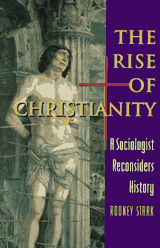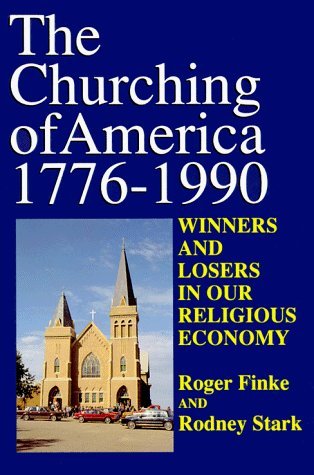by Margarita Mooney Clayton on April 2, 2012
This post originally appeared on the Black, White, & Gray blog.
Can ideas from economics, such as that monopolies are lazy and that competition leads to better products, be applied to understand religion? Every year I teach my students–both those in my class on economic sociology and those in my class on sociology of religion–about the economistic or the rational choice perspective on religion.
Most people think individual religious behaviors and religious organizations are driven by emotions, theology, and/or tradition. But rational choice theories of religion are modeled are assumptions about human behavior now current in mainstream economics: humans are rational, self-interested beings who seek to maximize rewards and minimize their costs. What makes religion so powerful in motivating human behavior is that most religions promise rewards or punishment in another life.
 One path-breaking book which applies the rational choice perspective to American religion is Roger Finke and Rodney Stark’s “The Churching of America 1776-1990: Winners and Losers in Our Religious Economy,” which won the Distinguished Book Award from the Society for the Scientific Study of Religion. Given that the U.S. has never a state-established religion, religious groups here have always had to win over adherents. To explain which religious groups thrive under these conditions of an open market for religion, Finke and Stark use vocabulary about markets, calling established churches lazy monopolies and describing tent revivals as an important part of competition between religious firms. Because of the American constitutional protections of religious freedom, the U.S. has always had an open religious market, and in that market, upstart, preaching, fiery sects win more followers, both historically and today. How does this happen? The free market gets rid of weak religious firms and rewards the ones that work hard to get people to join.
One path-breaking book which applies the rational choice perspective to American religion is Roger Finke and Rodney Stark’s “The Churching of America 1776-1990: Winners and Losers in Our Religious Economy,” which won the Distinguished Book Award from the Society for the Scientific Study of Religion. Given that the U.S. has never a state-established religion, religious groups here have always had to win over adherents. To explain which religious groups thrive under these conditions of an open market for religion, Finke and Stark use vocabulary about markets, calling established churches lazy monopolies and describing tent revivals as an important part of competition between religious firms. Because of the American constitutional protections of religious freedom, the U.S. has always had an open religious market, and in that market, upstart, preaching, fiery sects win more followers, both historically and today. How does this happen? The free market gets rid of weak religious firms and rewards the ones that work hard to get people to join.
Does comparing religious preaching to marketing a consumer product sound strange to you? In class, I show my students sections of Barnard College religious historian Randall Balmer’s excellent DVD based on his book “Mine Eyes Have Seen the Glory: A Journey Into the Evangelical Subculture of America.” In that video, some of the leaders of Willow Creek Community Church outside of Chicago unreservedly use market language to describe what they do: they are taking the Bible and packaging it as a product that is produced and marketed for a specific niche of people. In their view, their marketplace strategy paid off, as evidenced by their reputation and market share.
 While many people may be persuaded that religion is rational insofar as participating in rituals produces positive emotions and attending church builds social networks, in his famous book “The Rise of Christianity: A Sociologist Reconsiders History” Rodney Stark dedicates one chapter to explaining why even sacrifice and martyrdom are rational. If rationality implies consistent, goal-oriented activity, then sacrifice is rational because it brings great rewards. However, the problem with many religious rewards is that they exist in another world that can’t be seen.
While many people may be persuaded that religion is rational insofar as participating in rituals produces positive emotions and attending church builds social networks, in his famous book “The Rise of Christianity: A Sociologist Reconsiders History” Rodney Stark dedicates one chapter to explaining why even sacrifice and martyrdom are rational. If rationality implies consistent, goal-oriented activity, then sacrifice is rational because it brings great rewards. However, the problem with many religious rewards is that they exist in another world that can’t be seen.
Stark then concludes that “the powerful ascetic current that persists in all religious traditions is a natural response to the problem of religious risk. Moreover, by the same logic we can conclude: Martyrs are the most credible exponents of the value of religion, and this is especially true if there is a voluntary aspect to their martyrdom” (Stark, Rise of Christianity, P. 174).
Talking about religion as a product marketed to buyers and sellers sounds appealing, saying that Methodists and Baptists are just like competing car firms is intriguing, and arguing that martyrs aren’t crazy but rational is counter-intuitive. Ultimately, however, rational choice theory doesn’t provide a comprehensive explanation of individual religious behavior or organizational religious behavior. Do some things about religion resemble market behavior? Yes. That is why I always teach rational choice theory: it provides unique insights into religion. As long as rational choice theory and its assumptions about forward-looking and self-interested behavior are considered alongside other important explanations of religious behavior, I think it makes an important contribution to understanding religion. But rational choice ultimately only tells us somethings about religion, not everything, nor even the most important things about religion.
All social analysts–whether paid academics scholars like myself, journalists or readers of this blog–should put rational choice explanations of behavior alongside other perspectives, such as cultural and organizational theories. For example, it was not only competition from new religious movements or community megachurches like Willow Creek that led to the declining identification with religious denominations in America, but also important theological changes within those denominations about the authority of scripture, among other things. Dramatic cultural changes since the 1960s have also changed what people expect from religion–the God some people seek out today may be an authoritative God that expects sacrifice but for many others seek a therapeutic God who provides psychological comfort on demand.
Rational choice theory undoubtedly made some important contributions when it was first applied to religion. But we don’t need to hold on to one theoretical perspective as the only or even the best explanation for religious behaviors; our task is rather to draw critically from a variety of perspectives to shed light on real religious trends we see in the U.S. and around the world today.
